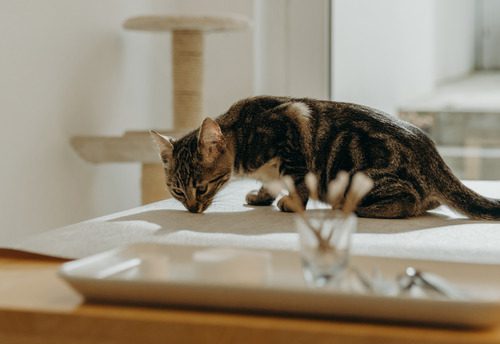Pancreatitis in Cats

Pancreatitis in cats is a serious condition that affects the pancreas, an essential organ responsible for digestion and insulin production. When the pancreas becomes inflamed, it can disrupt normal digestive functions and lead to discomfort, pain, and other complications. Unlike in dogs, feline pancreatitis often occurs without a clear cause, making early detection and veterinary care essential. If your cat shows signs of illness, seeking immediate veterinary attention at Timberline Veterinary Emergency and Specialty in Seattle, WA, can make a significant difference.

What Is Pancreatitis in Cats?
The pancreas plays a vital role in your cat’s overall health by producing digestive enzymes and regulating blood sugar. When it becomes inflamed, those enzymes can begin attacking the pancreas itself, leading to pain and potential damage. Pancreatitis in cats can be mild or severe, and in some cases, it can lead to life-threatening complications.
Acute vs. Chronic Pancreatitis
- Acute Pancreatitis: This form develops suddenly and may cause severe symptoms. Cats with acute pancreatitis often require immediate veterinary intervention to manage pain, dehydration, and other complications.
- Chronic Pancreatitis: This type is a long-term condition where inflammation persists over time. Chronic pancreatitis in cats may have milder symptoms, but it can lead to ongoing health issues and potential organ damage.
Both forms of pancreatitis require veterinary attention. Identifying the symptoms early and consulting a veterinary professional at Timberline Veterinary Emergency and Specialty can help improve outcomes for your cat.
Causes and Risk Factors of Pancreatitis in Cats
Veterinarians do not always identify a direct cause of pancreatitis in cats, but several risk factors can contribute to the condition.
Potential Causes
- Dietary Factors: While not as strongly linked as in dogs, certain high-fat diets or dietary indiscretions may contribute to pancreatic inflammation.
- Infections: Some bacterial, viral, or parasitic infections can trigger inflammation in the pancreas.
- Trauma: Physical injuries, such as falls or blunt force trauma to the abdomen, may damage the pancreas.
- Toxins and Medications: Some medications, including certain antibiotics and chemotherapy drugs, can lead to pancreatitis.
- Concurrent Diseases: Conditions such as diabetes, liver disease, or inflammatory bowel disease (IBD) often occur alongside pancreatitis, complicating diagnosis and treatment.
Risk Factors
- Obesity: Overweight cats may have a higher risk of developing pancreatitis due to metabolic changes.
- Breed Predisposition: While any cat can develop pancreatitis, some breeds, such as Siamese cats, may be more prone to the condition.
- Age and Health Status: Senior cats and those with underlying health conditions may be more vulnerable.
Symptoms of Pancreatitis in Cats
Recognizing the symptoms of pancreatitis in cats can help ensure prompt veterinary intervention. Unlike dogs, cats with pancreatitis often exhibit subtle or vague symptoms, making it more challenging to diagnose.
- Loss of appetite
- Lethargy
- Vomiting and nausea
- Abdominal pain
- Diarrhea
- Fever or Low Body Temperature
If your cat displays any of these symptoms, contact Timberline Veterinary Emergency and Specialty at 206-828-6868 for immediate veterinary care.
Diagnosing Pancreatitis in Cats
Since pancreatitis in cats can mimic other illnesses, veterinarians use a combination of diagnostic tests to confirm the condition.
Diagnostic Tests
- Physical Examination: Your veterinarian will check for signs of abdominal pain, dehydration, and overall health status.
- Blood Tests: These may include complete blood counts (CBC) or biochemistry panels, to detect inflammation.
- Ultrasound Imaging: Abdominal ultrasounds help visualize the pancreas and detect abnormalities.
- X-rays: Although not always conclusive, X-rays may help rule out other conditions.
Potential Treatment Options for Pancreatitis in Cats
Veterinary treatment for pancreatitis in cats focuses on supportive care and managing symptoms. Early intervention improves recovery chances and helps prevent complications.
Supportive Care
- Hospitalization: Many cats require hospitalization to receive intravenous (IV) fluids and medications.
- Pain Management: Veterinarians prescribe pain relief to help cats feel more comfortable.
- Nutritional Support: Cats with pancreatitis often need appetite stimulants or feeding tubes to maintain proper nutrition.
- Antiemetics: Medications to control vomiting and nausea may be necessary.
- Ongoing Monitoring: Regular check-ups ensure that treatment is working and that complications do not arise.
If your cat exhibits signs of pancreatitis, seeking veterinary care immediately can improve their quality of life. The team at Timberline Veterinary Emergency and Specialty in Seattle, WA, is here to provide expert care and support. Call us at 206-828-6868 today.
Recent Posts
About Us
Timberline Veterinary Emergency & Specialty is a locally owned, veterinarian-led hospital founded in 2023 by Dr. Laura Ahlgrim, Dr. Beth Davidow, and Dr. Chris Bailey. As Seattle residents, we understand that pets are family—and when emergencies arise, you need care you can trust. Our mission is to provide exceptional emergency and specialty services with compassion, transparency, and medical excellence. We're here to support your pet’s health while fostering a stronger, kinder veterinary community.
